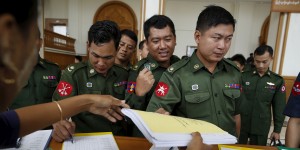The Burma Army Must Respect a “Free and Fair” Election
By Burma Partnership • September 29, 2015 A request from the Burma Army to issue army personnel as polling station officers across 15 polling stations within military compounds in Zeyathiri Township has been denied by an election sub-commission in Naypyidaw. The demand from the Burma Army cites security concerns as a primary reason for involvement in the polling stations, though sub-commission officials are well aware that this will raise concerns amongst election observers. According to Burma’s Election Law, polling station officers are to be appointed from positions within the civil service, such as from the education ministry.
A request from the Burma Army to issue army personnel as polling station officers across 15 polling stations within military compounds in Zeyathiri Township has been denied by an election sub-commission in Naypyidaw. The demand from the Burma Army cites security concerns as a primary reason for involvement in the polling stations, though sub-commission officials are well aware that this will raise concerns amongst election observers. According to Burma’s Election Law, polling station officers are to be appointed from positions within the civil service, such as from the education ministry.
The request from the Burma Army follows a pattern of control over what should be considered “free and fair elections.” Previously, control over the elections appeared to occur in a much more indirect manner and would often use the Union Election Commission (UEC) to influence the electoral process. In June of this year, the Chairman of the UEC, Tin Aye, announced that political parties would be disallowed from campaigning within military barracks. Meanwhile, the UEC also received criticism for intimidating the National League for Democracy, after the party issued a statement urging the Burma Army to support constitutional reform. In August 2015, it was revealed that the UEC’s candidate rejections disproportionately targeted Muslim parliamentary candidates, in an apparent effort to discourage representation amongst Burma’s religious minority.
The most revealing act of military support occurred on 29 August 2015, when the UEC declared that political parties were prohibited from denouncing the Burma Army or speaking out against the 2008 Constitution. This prompted a wide condemnation from international actors including Brad Adams, Asia Director of Human Rights Watch, who stated, “A gag order on criticizing the military and the constitution shows the army’s lack of commitment to democracy. This throwback to the days of military dictatorship reveals the dangerous collusion between the armed forces and the election commission.”
While the Naypyidaw sub-commission should be commended for preventing military officials from acting as polling station officers, the influence of the Burma Army over the 2015 elections is likely to continue unabated. In fact, the staff of the UEC is also similarly comprised of individuals with connections to the military. In addition, it is no secret that the UEC, the very same institution that has been charged with ensuring transparency and legitimacy in the 2015 elections, is overwhelmingly biased towards the Burma Army. The UEC Chairman, Tin Aye, has publicly stated his attachment and love for the military, being a former Lieutenant-General and patron of the military-backed Union Solidarity and Development Party.
In the lead up to the 2015 elections, there is significant room for continued exploitation and frauds of the electoral process. For instance, the concerns of ethnic parties that the election will be cancelled due to convenient “security concerns” is already becoming well founded. Last week, it was announced that 20,000 citizens in Karen State – largely of the Mon ethnic group – would be unable to vote on 8 November 2015 due to “security concerns”. Meanwhile, the UEC is still receiving criticism over its incomplete and disorganized voter registration lists and the disenfranchisement of an entire religious minority group, the Rohingya, continues without any sign of intervention.
It is clear that the Burma Army is threatened by the prospect of a diminished role in the aftermath of the 2015 elections. As seen in the influence over the UEC and the broader electoral process, the Burma Army and its backed ruling party, the USDP is likely to continue operating both in the open and behind the scenes to manipulate the elections to their preferred outcome. If the elections are to be “free and fair”, as promised by the UEC, more must be done to remove the overarching power of the Burma Army from the electoral process. A lack of commitment to a transparent and legitimate democratic election will only prolong the suffering of Burma’s people and further backsliding of the reform towards democratization. International election monitors who pledged their support to a free and fair election need to speak out about Burma Army’s interference in the election process.
Tags: 2015 Elections, Burma Partnership, Ethnic Nationalities, Human Rights, Karen State, Myanmar’s Union Election Commission (UEC), United Solidarity Development Party (USDP)This post is in: 2015 Burma Elections, Blog
Related PostsArmed Forces and Democratization in Myanmar: Why the U.S. Military Should Engage the Tatmadaw
Burma: Country Reports on Human Rights Practices for 2015
Report of the Special Rapporteur on the situation of human rights in Myanmar
Atrocities Prevention Report: Targeting of and Attacks on Members of Religious Groups in Burma
The 2015 Elections and Beyond: Perspectives from villagers in rural southeast Burma/Myanmar









 All posts
All posts